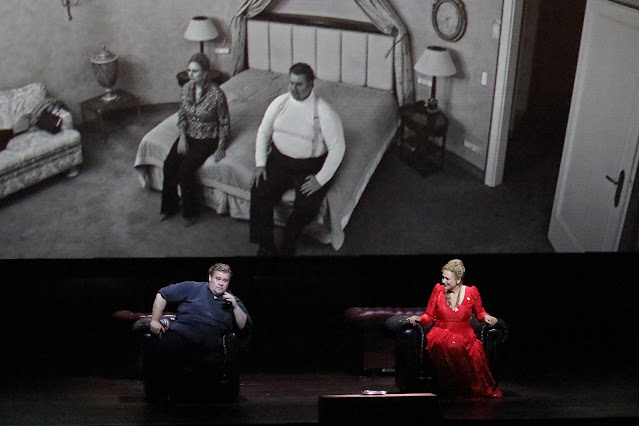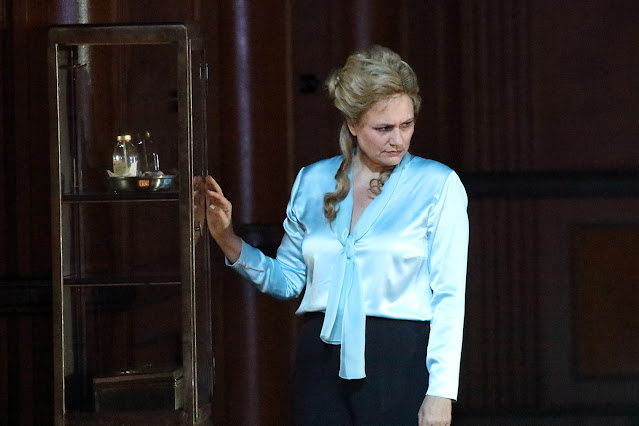Palais Garnier
Tom Rakewell – Ben Bliss
Nick Shadow – Iain Paterson
Trulove – Clive Bayley
Anne Trulove – Golda Schultz
Mother Goose – Justina Gringytė
Baba the Turk – Jamie Barton
Sellem – Rupert Charlesworth
Keeper of the Madhouse – Vartan Gabrielian
Voices from the Crowd – Ayumi Ikehata, Frédéric Guieu
Solo Voice – Laurent Laberdesque
Revival director – Joséphine Kirch
Designs – Pierre-André Weitz
Lighting collaboration – Bertrand Killy
 |
| Images: Guergana Damaniova / OnP |
The Rake’s Progress seems, as Stravinsky admitted, almost ‘to have been to have been created for journalistic debates concerning: a) the historical validity of the approach; and, b) the question whether I am guilty of imitation and pastiche.’ Or so, once, it did—to me, at least, and I think to many others too. I no longer bother about such questions; I am not sure anyone else does either. That does not mean it has ceased to pose us questions. Far from it. Their nature, though, has changed and they tend to focus, quite rightly, on the musical drama rather than ‘legitimacy’ or even timeliness. If in some yet far from all ways, it marked the end of a line, or at least a high watermark, for the neoclassical Stravinsky, with distance, it seems far from the end of a musical line. More to the point, in its very artificiality and neither entirely like nor unlike Così fan tutte – their orchestras, as Stravinsky noted, similar in size – it seems increasingly to move audiences and indeed performers in ways all too readily missed by earlier generations.
Entirely by coincidence, I had spoken a little about The Rake’s Progress in a session of my undergraduate class on Mozart’s operas earlier in the week, taking it and Der Rosenkavalier as two highly contrasted twentieth-century operas consciously written in Mozart’s wake. It was probably that that had lodged a further Stravinskian utterance in my mind: ‘If the Rake contains imitations, however – of Mozart, as has been said,’ Stravinsky owned, ‘I will gladly allow the charge (given the breadth of the Aristotelian word), if I may thereby release people from the argument and bring them to the music.’ That ‘if’, however is the point; it is actually rarely Mozart who comes to my mind, the coincidences being too obvious, whether in Stravinsky or in Auden (Da Ponte too, of course). If anything, that was even less so here, in a performance led by Susanna Mälkki which felt more remote both from such ‘debates’ and indeed from any performing tradition than another I can recall. There were things I missed:, the polemical Stravinsky, the ultra-referential Stravinsky, much of the archness and the bite, to which somewhat soft-centred playing from the Paris Opéra orchestra contributed (presumably at the conductor’s request).
Other correspondences nonetheless arose: that of the balletic Stravinsky, not so much the ‘great’ scores of the early century as some closer in time to the Rake: the Scènes de ballet in particular, but also, at a somewhat greater distance, Jeu de cartes and even the Tchaikovskian Fairy’s Kiss. Such neoclassicism makes sense, of course, though it also draws into question the usefulness of the term, since it refers to and indeed means such very different things in different contexts and at different times, all the more so when unmistakeable ostinato kinship with Oedipus Rex (beyond that, also to Poulenc) reared its head. These may well have been as much my thoughts as anything intended; it is difficult to say. But what I did sense, quite strongly, was a more overt sense of sadness – partly tempi, which often felt slow – and even tragedy. It was as if the work, consciously or otherwise, were being assimilated into a more ‘operatic’, even Italianate, tradition such as Stravinsky himself spoke of, that of Verdi, but also at times that of Berg, the latter perhaps ironically, given the contrast Stravinsky himself drew with that tradition, eschewing ‘forms symbolically expressive of the dramatic content (as in the Daedalian examples of Alban Berg)’ in favour of number opera. But then should we ever take Stravinsky at his word, or at least at face value?
That musical trajectory seemed to proceed broadly in tandem with Olivier Py’s production, here on the first night of its revival. Haunted by death, in the ‘person’ of Tom’s uncle’s skeleton, and also, at the front of the stage, by the memento mori of a skull and hourglass, it too seemed to say or accept that this was less an opera about opera than it was simply an opera. Anne bore Tom’s child, who had advanced a few years by the final scene. Again, there was loss, at least for me, not least in any sense of London, a major character not only in Hogarth but surely at least in Auden too. Perhaps, though, I feel that more keenly as a Londoner, and one should not be restrictive about such things. There was not so much either, though, of city life, even more generically. The production felt not so much abstracted as moving psychology to the foreground, almost to the exclusion of anything else. On its own terms, all was stylishly presented, Pierre-André Weitz’s designs showing a keen eye for colour schemes and correspondences. Dance, both in character and more abstract-interpretative, played a role, heightening that sense of kinship with the composer’s ballets.
The cast was strong throughout, with a lovely central pair in Ben Bliss’s Tom and Golda Schultz’s Anne. Bliss’s performance engaged one’s sympathies through honeyed tone and acting alike. Schultz presented a stronger, more ‘present’ character than is often the case, and was all the better for it. Iain Paterson’s Nick Shadow was quite without caricature, a more rounded character in the conventional sense, in keeping with broader parameters of performance and production. Love her or hate her, you cannot ignore Baba the Turk, and that was very much the knowing showbiz strategy of Jamie Barton’s assumption of the role. I especially enjoyed Rupert Charlesworth’s auctioneer Sellem, perhaps the most vocally acted of all performances, manner and mannerism conveying so much with relatively little: highly Stravinskian, one might say. Other roles were all well taken, with a keen sense of theatre, chorus members and dancers included. If there were times when I felt the chorus, like the orchestra, lacked Stravinskian bite, that was doubtless in part a consequence of Mälkki’s interpretative stance than performance as such.
Where, then, does that leave us? Going
round in further circles? To an extent, yes; does it not always with this work?
Yet the repertoire assimilationism did bring something new, surely to be
welcomed, whatever my personal likes or dislikes. Once again, I was led to
reflect on how much we, or at least I, might be steered by Stravinsky’s CBS
recording, technically flawed yet in possession of qualities it is difficult
not to think near-definitive. It is surely a sign of maturity that, however
much that may be imprinted on some of our memories, the work and our reactions
to it have multiple lives beyond any of its creators. I never sympathised with,
say, Boulez’s condemnation to Cage: ‘Have you heard Rake’s Progress?
What ugliness!’ though I understood why he might have thought so and perhaps in
part wanted to agree. Right now, though, I am grateful to have gone beyond that,
as surely we all should have, seventy years on. Debates change yet persist.




